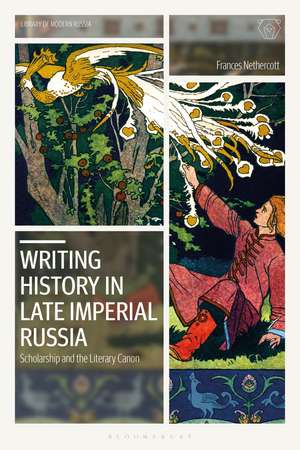Writing History in Late Imperial Russia: Scholarship and the Literary Canon: Library of Modern Russia
Autor Frances Nethercotten Limba Engleză Hardback – 25 dec 2019
| Toate formatele și edițiile | Preț | Express |
|---|---|---|
| Paperback (1) | 219.01 lei 6-8 săpt. | |
| Bloomsbury Publishing – 16 iun 2021 | 219.01 lei 6-8 săpt. | |
| Hardback (1) | 659.74 lei 6-8 săpt. | |
| Bloomsbury Publishing – 25 dec 2019 | 659.74 lei 6-8 săpt. |
Din seria Library of Modern Russia
- 22%
 Preț: 230.43 lei
Preț: 230.43 lei - 22%
 Preț: 225.77 lei
Preț: 225.77 lei - 23%
 Preț: 199.20 lei
Preț: 199.20 lei - 13%
 Preț: 188.59 lei
Preț: 188.59 lei - 22%
 Preț: 230.61 lei
Preț: 230.61 lei - 18%
 Preț: 166.36 lei
Preț: 166.36 lei - 22%
 Preț: 224.66 lei
Preț: 224.66 lei - 18%
 Preț: 231.99 lei
Preț: 231.99 lei - 22%
 Preț: 232.25 lei
Preț: 232.25 lei - 22%
 Preț: 223.76 lei
Preț: 223.76 lei - 22%
 Preț: 224.76 lei
Preț: 224.76 lei - 22%
 Preț: 231.63 lei
Preț: 231.63 lei - 23%
 Preț: 197.68 lei
Preț: 197.68 lei - 23%
 Preț: 198.85 lei
Preț: 198.85 lei - 23%
 Preț: 198.40 lei
Preț: 198.40 lei - 23%
 Preț: 229.78 lei
Preț: 229.78 lei - 20%
 Preț: 219.57 lei
Preț: 219.57 lei - 21%
 Preț: 218.36 lei
Preț: 218.36 lei - 21%
 Preț: 219.01 lei
Preț: 219.01 lei - 21%
 Preț: 218.65 lei
Preț: 218.65 lei - 22%
 Preț: 230.33 lei
Preț: 230.33 lei - 21%
 Preț: 218.74 lei
Preț: 218.74 lei - 23%
 Preț: 191.04 lei
Preț: 191.04 lei - 23%
 Preț: 190.75 lei
Preț: 190.75 lei - 30%
 Preț: 510.55 lei
Preț: 510.55 lei
Preț: 659.74 lei
Preț vechi: 945.02 lei
-30% Nou
Puncte Express: 990
Preț estimativ în valută:
126.24€ • 132.16$ • 104.46£
126.24€ • 132.16$ • 104.46£
Carte tipărită la comandă
Livrare economică 08-22 aprilie
Preluare comenzi: 021 569.72.76
Specificații
ISBN-13: 9781350130401
ISBN-10: 1350130400
Pagini: 296
Dimensiuni: 156 x 234 mm
Greutate: 0.68 kg
Editura: Bloomsbury Publishing
Colecția Bloomsbury Academic
Seria Library of Modern Russia
Locul publicării:London, United Kingdom
ISBN-10: 1350130400
Pagini: 296
Dimensiuni: 156 x 234 mm
Greutate: 0.68 kg
Editura: Bloomsbury Publishing
Colecția Bloomsbury Academic
Seria Library of Modern Russia
Locul publicării:London, United Kingdom
Caracteristici
The first in-depth study of how a nostalgia for fiction informed late Imperial Russian scholarship
Notă biografică
Frances Nethercott is Reader in Modern European History at the University of St. Andrews, UK. She is the author of Une rencontre philosophique: Bergson en Russie, 1907-1917 (1995), Russia's Plato: Plato and the Platonic Tradition in Russian Education, Science and Ideology, 1840-1930 (2000) and Russian Legal Culture Before and After Communism (2007). She also serves on the editorial board of Studies in East European Thought and is a member of the international board of History of European Ideas.
Cuprins
Introduction1. Between State Patronage and Oversight: Developments in History as a University Discipline2. The Scholar-Artist: Master Historians and their Literary Muses3. Style: The Literary Cadences of Russian Historical Narrative4. The Historian's Literary Toolbox: Portraiture5. Literary Evidence: Realist Aesthetics and Historical Enquiry6. Place: Excursion History and the Question of Literary Sites7. The Historian's Literary Compass: Modern Poets and Novelists8. Historical and Literary Historical Scholarship: A Hybrid Science?Epilogue: The Forgotten Legacy
Recenzii
Presents rich accounts of episodes and aspects of the careers of significant historians, and is instructive with regard to many topics in Russian imperial educational, as well as intellectual and cultural history. ... an essential resource for anyone interested in Russian imperial historiography or the interface of the literary and historical imaginations in nineteenth-century Russia.
Nethercott's book shows the various ways in which history and literature have interacted, as seen from the point of view of history and professional historians.
Escaping the straitjacket of conventional historiography, Writing History in Late Imperial Russia makes a subtle and original contribution to Russian intellectual history by exploring the relationship between history and literature in the work of three crucial generations of historians.
By carefully examining the writings of the most prominent Russian historians of this period, Frances Nethercott skillfully reveals the literary impulse in Russian historical scholarship and penetrates into the inner workings of the historian's craft. In so doing, this fascinating book makes an important contribution to the field of Russian cultural studies.
Nethercott's book shows the various ways in which history and literature have interacted, as seen from the point of view of history and professional historians.
Escaping the straitjacket of conventional historiography, Writing History in Late Imperial Russia makes a subtle and original contribution to Russian intellectual history by exploring the relationship between history and literature in the work of three crucial generations of historians.
By carefully examining the writings of the most prominent Russian historians of this period, Frances Nethercott skillfully reveals the literary impulse in Russian historical scholarship and penetrates into the inner workings of the historian's craft. In so doing, this fascinating book makes an important contribution to the field of Russian cultural studies.
